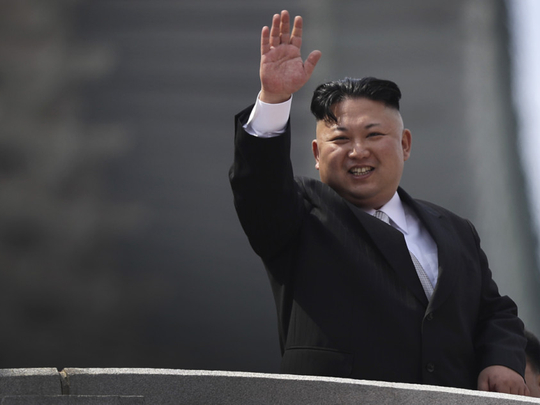
United States Ambassador Nikki Haley’s remarks last week at the United Nations, after North Korea’s latest missile test, sounded like what a superpower should say: If war comes, “the North Korean regime will be utterly destroyed”. If China doesn’t cut off oil to the Hermit Kingdom, “we can take the oil situation into our own hands”.
It would have been a great speech in 1997. That was when signatories to the nuclear non-proliferation treaty were loath to violate it. It was before North Korea had tested its first nuclear device. It was before the US cut a deal with Iran to overlook its past nuclear transgressions in exchange for a temporary freeze on its nuclear programme and a free pass to test missiles.
In 2017, though, Haley’s warnings and the cruder ones from her boss, President Donald Trump, are disconnected from reality. And here it’s important to remember why the president and his envoys are making threats in the first place. All of this is in the service of a discredited policy to not allow North Korea to obtain a nuclear weapon. The idea has been to threaten, coddle and tempt North Korean leader Kim Jong-un to start negotiations that would lead to him abandoning them.
Well, this is never going to happen. America and its allies have been trying this for about a quarter century, and the North Koreans burn us every time. Now North Korea needs only to perfect a nuclear warhead that can survive re-entry into the atmosphere to have a credible nuclear threat against the US. As Michael Auslin, a fellow in contemporary Asia at the Hoover Institution, told me last week: “That’s only a matter of time. It’s a technical issue at this point. They are going to get it.”
So it’s time for a new approach: Give up. America should never “accept” North Korea as a nuclear weapon state. But it can end the pointless cycles of pressure and negotiation. The North Koreans have used all that posturing to buy time to perfect their nukes, and the Chinese have artfully used that dance to distract us from countering China’s own predations.
And yes, I know “give up” sounds dangerously un-American. Let’s put it another way: Focus on a battle America has not yet lost.
Instead of wasting the resources of an already depleted US State Department on preparing for more talks with representatives of an Asian prison state, America’s diplomats and strategic planners can focus on improving America’s deterrence against North Korea. American diplomacy and military bandwidth can be devoted to countering China’s militarisation of the South China Sea and its broader economic and political strategy to turn America’s Pacific and east Asian allies into vassals of Beijing. In the future, Trump and his diplomats won’t have to spend their meetings with Chinese counterparts, pleading with them to get their client state to behave. That’s China’s problem now. America is developing even better technology to shoot North Korean missiles out of the sky before they land.
Then there’s credibility. It’s true that America would have taken a hit with a “give up” strategy a few years ago. But today North Korea is almost there. Despite Trump’s occasional tweeted threats, it’s hard to believe he will order a pre-emptive strike. Even if he did, it would probably not be all that effective. The fact that North Korea tested its missile last week on a mobile launcher makes it that much more difficult to take out these sites. This says nothing of the risk that the North would retaliate with conventional artillery shells to destroy the capital of South Korea, Seoul.
Besides, nuclear weapons are expensive. Countries already integrated into the global system face penalties and pressure that outlaws like North Korea really don’t. “By acknowledging the reality of North Korea as a nuclear power, it doesn’t automatically mean Zimbabwe wants a nuclear weapon,” Auslin told me. “Those who want nuclear weapons are already trying to get them.”
To give up on prevention is to focus on treatment. We need more creative options to deal with the North Korean menace. No longer will American diplomats have to worry about how Pyonyang’s tyrant will react to senior officials speaking the truth about his debased regime. Kim wants nukes so his regime can survive. Nuclear negotiations meant assuring him that America has no interest in seeing his people live in dignity and freedom. America will not have this problem anymore.
Think of the opportunities. The president could elevate and call attention to brave North Korean dissidents. He could encourage them to begin planning for a transition to Korean democracy. Imagine a White House conference: ‘Planning for a Korea Without the Kim Regime’. Who knows? With a little luck maybe a constellation of dissidents could form a government in exile. Giving up on stopping a North Korean nuke means getting America on the right side of Korean history.
Finally, there is the benefit of stability. Kim will no longer have the ability to throw the region and the world into crisis every time he tests a nuclear device or a missile. America should still try to sabotage his programme through cyber viruses and more conventional means. But in the short term, Kim will lose his ability to get the world to focus on his threats whenever he wishes.
It’s something the Trump administration should think about. And maybe the next time Kim decides to provoke, the US response can be measured and boring. The Pentagon should trot out some deputy assistant under-secretary to say the US frowns upon the latest move, but that North Korea knows full well what will happen if it ever attacks America or her allies. Meanwhile, Trump could tweet something about his upcoming White House conference: ‘Imagining a world without North Korea.’ It sure beats empty threats in the service of dead-end talks.
— Bloomberg
Eli Lake is a Bloomberg View columnist. Twitter: @elilake.










